We test Edge vs Chrome vs Brave vs Vivaldi vs Opera vs SRWare Iron
We recently published an article testing various aspects of the three main browsers’ performance– Edge, Chrome, and Firefox: Which Is The Fastest Browser?. In response to a reader’s request, I have since tested all popular Chromium-based browsers to see which performs the best over four benchmarks with each benchmark testing different aspects of the browser’s performance. For the purpose of this exercise, all browsers are at default settings and with zero extensions. The following are the results for Brave, Vivaldi, Opera, and SRWare Iron. Results for Edge and Chrome (as per that earlier article) will be added into a table at the end. In all tests, higher numbers are better.
Speedometer: Browser Test #1
Speedometer is a benchmark tool that measures the responsiveness of Web applications by repeating the same actions using DOM APIs. The benchmark simulates user actions for adding, completing, and removing to-do items using multiple examples.
JetStream2: Browser Speed Test #2
JetStream2 is a JavaScript and WebAssembly benchmark suite that bases its results on how quickly the browser can start up, execute code, and run smoothly.
Basemark Web 3.0: Browser Speed Test #3
Basemark Web 3.0 is a benchmarking tool that utilizes multiple tests to gauge browser performance including WebGL tests, SVG tests, stress tests, and more (20 tests in total).
MotionMark: Browser Speed Test #4
MotionMark is a graphics benchmark that throws a heap of different graphics at the browser to see how it handles them. Technically, it measures a browser’s capability to animate complex scenes at a target frame rate.
Benchmarks Overall Results
NOTE: For the Basemark and MotionMark test results, I’ve moved the decimal point one place to the left so as not to skew the overall scores:
No real surprise to see Edge and Chrome first and second respectively. Some might be a bit surprised to see Brave at the bottom of the pile, and SRWare Iron has proven to be just as good as I always thought it was. As I have said previously, there are other factors involved when choosing a browser and I doubt these types of results will influence too many users. No doubt Brave’s claims of enhanced privacy will appeal to some and Vivaldi’s extensive customization options to others. Based purely on performance/speed though, it appears that none of the comparatively new kids on the block can challenge Edge and/or Chrome.
BOTTOM LINE:
I should point out that the combination of these benchmarks is probably more of a test of a browser’s “performance” rather than speed, although speed certainly plays an important part. Anyway, even though there is not that much to pick between these Chromium-based browsers, it’s clear that Edge has the edge, so to speak.
It’s also worth bearing in mind that browsers incorporate so many processes and tasks it is nigh on impossible to determine exact performance/speed in real-world terms. That’s why the various developers can get away with claiming their browser is the fastest– because any such claims are extremely difficult to substantiate and therefore equally difficult to repudiate.
—

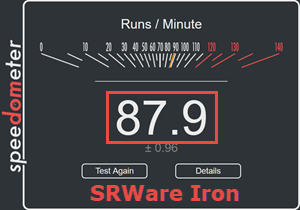
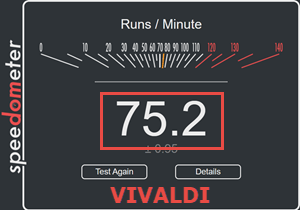

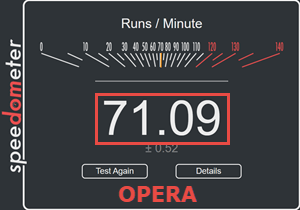
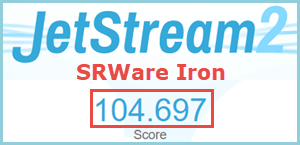
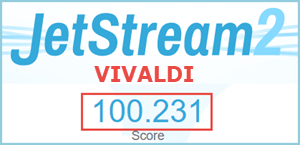

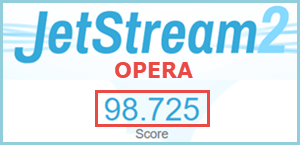

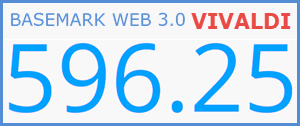
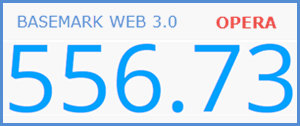




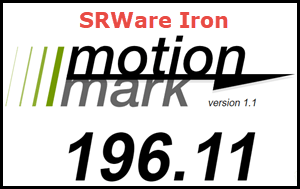

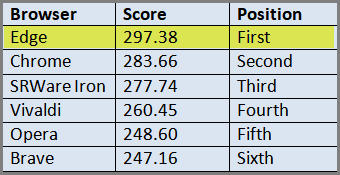
Interesting comparison. Thanks
Currently, I’m using Brave (with DuckDuckGo as search) due to it’s superior privacy that you mentioned. I’m sure you saw this widely reported tweet last week by DuckDuckGo that showed all the collected data Google collects in their browser (and apps) https://twitter.com/DuckDuckGo/status/1371509053613084679/photo/1
It is hard to read but all the data collected from the browser is:
Analytics
-Location — Coarse Location
-User Content – Audio Data, Customer Support
-Browsing History — Browsing History
-Identifiers — User ID, Device ID
-Usage Data — Product Interaction
-Diagnostics — Crash Data, Performance Data, Other -Diagnostic Data
-Other Data — Other Data Types
Product Personalization
-Location — -Coarse Location
-Browsing History — Browsing History
-Identifiers — User ID, Device ID
-Usage Data — Product Interaction
App Functionality
-Financial Info — Payment Info
-Location — Coarse Location
-User Content — Audio Data, Customer Support, Other User Content
-Browsing History — Browsing History
-Identifiers — User ID, Device ID
-Usage Data — Product Interaction
-Diagnostics — Crash Data, Performance Data, Other Diagnostic Data
-Other Data — Other Data Types
That’s a lot of data collecting.
Edge, Vivaldi, Opera (and Firefox) all collect some data, too.
As you mentioned, Brave’s claim is of enhanced privacy–Brave doesn’t collect anything. But it is also the slowest!
I’m not familiar with SRWare Iron browser. It is faster than Brave. I will need to look into SRWare Iron to see if it is as private as Brave.
Thanks for all the effort on this.
Yes, well, it has long been known that Google is the data collection champion. It’s why I have always been surprised by Chrome’s domination of the desktop browser market.
You are most welcome JD.
Jim, I was doing some searching on SRWare Iron Browser. Came across this site:
https://spyware.neocities.org/articles/iron.html
This site has some weird assertions about browsers, for example, he calls automatic updates (which are necessary for security) “spyware” because the browser has to contact the update server to get the update file. This is obviously dumb.
However, the author raises some concerning points about SRWare Iron.
1) Redirecting of internet searches through the developer’s domain.
2) The motivation for SRWare Iron is to monetize privacy concerns by generating traffic to his website, where they can make money by serving spyware to the very users that wanted to escape from it.
3) The SRWare Iron gets loaded up with all sorts of spyware from all sorts of other companies.
Jim, your familiar with this browser. I wondering what your thoughts are about this (if any).
Thanks.
JD
I didn’t get past this:
He calls Bing spyware also. Plus Bing is NOT the default search engine, Duck Duck Go is the default.
Typical tinfoil hat nonsense. We had a saying years ago JD… “Don’t believe everything you read in the newspaper“. Same applies for the www.
Read here: https://davescomputertips.com/tech-site-journalism-reaches-all-time-low/
Hi Jim,
You are probably right, but, the only detailed tests I can find on SRWare Iron browser are the speed comparison test you did and the neocites article above. All the other articles just state that SRWare Iron is a anonymous browser (stating the browser’s description but not testing this in any way). The Wikopedia site mentions that although SRWare Iron is open source, they frequently do not post the source. Plus the interview with the SRWare developer (although over a decade old) stating that their goal was to monetize SRWare by redirecting searches through their site raises privacy concerns to me.
As you correctly mention, there are multiple factors for choosing a browser. For me, privacy, over gain in speed, is more important. As far as my research shows, Brave is the most private browser, and therefore, for me, I continue to choose it as my main browser.
Also, I know Brave came out slower in your tests in speed than Chrome, but when I use the two, Brave “feels” faster to me, too. This is probably because I use Chrome with its defaults (i.e. clean), but have Brave setup with shields and options set to my liking–i.e. possibly making it even faster than it is with its default settings.
Geez JD, If I didn’t know better I would’ve thought I wrote this, lol. DITTO on everything you wrote and my setup is identical to yours. Excellent post!
PS — Jim, as always, excellent research and write-up!
JC
So JD, you’ve obviously forgiven Brave for redirecting searches to affiliated crypto companies in exchange for a commission? Brendan Eich said it was a “mistake”. Yeah, sure. In most people’s eyes, what they really did was break the eleventh commandment… “Thou shall not get caught”.
https://decrypt.co/31522/crypto-brave-browser-redirect
All browser developers need to create an income stream, some go about it in an underhanded manner but all are guilty in some way or another. Nothing is for free, there is always some sort of quid pro quo.
Hi Jim,
First, this didn’t affect me because I have the crypto currency BAT feature shut off and didn’t search for the few crypto currency searches that they were redirecting.
Second, this was not a privacy issue, it was a trust issue. The referral was not dynamically generated for specific users. A static referral used by all users cannot be a privacy issue because tracking of specific users based on that is impossible.
Third, Brave fixed the problem within days, apologized, and promised it would never happen again.
As you said, all browser makers need to develop an income stream. Brave uses Brave Rewards as theirs. Brave Rewards help fund the browser (their investors are interested in the success of BAT and they receive a small commission whenever a Brave user donates BAT). Again, I do not use the crypto features of Brave and have them turned off.
Each person has to pick the browser they want based on their preferences. My most important preferences are compatibility and privacy. Web compatibility leaves out the Tor Browser as a daily browser (plus it is really slow) and my browser needs to be Blink engine based. I used Firefox as my main browser for 15 years but stopped due to some web pages being incompatible and their increasing privacy issues—plus the fact that almost all their funding comes from Google. My research shows that Brave is currently the most private browser for a daily browser.
Brave:
– Has the strongest fingerprinting defenses.
– Brave’s internal adblocker can do CNAME uncloaking
– As of Chrome version M88, Manifest V3 is in beta. Once, Manifest V3 comes out of beta and reaches production later this year, most browsers will have no real adblocker i.e. UBlock will stop working. Brave’s internal adblocker is not an extension and will continue to work.
So Jim, currently, for me, Brave is my main browser. But, I am not devoted to it. That is why, when you mentioned SRWare Iron in your article, I looked into it. But, as I explained to you in a previous post, I chose to continue with Brave. For you, the increased speed of SRWare Iron may outweigh the potential privacy issues. And, you may not like Brendan Eich. Or, maybe you just don’t trust Brave. That’s fine, each has to make those decisions for themselves.
Thanks Jim
Hey JD,
Privacy or no, redirecting users away from their intended target is a pretty low act and especially when it’s obviously specifically designed to generate more revenue.
Jim, one more thing.
As you probably read, Brave Software recently acquired the Tailcat search engine. Tailcat will be integrated in to Brave Browser, as Brave Search. Brave Search is intended to be an alternative for Google Search, while being a privacy-focused service that does not collect IP addresses or personal information, and won’t track users (sounds similar to DuckDuckGo). DuckDuckGo’s search suggestions (Autosuggest) are powered by Microsoft’s Bing, Yahoo, etc. In fact, it has hundreds of sources. Tailcat on the other hand is an independent search engine, i.e., it doesn’t rely on Bing, Google, etc, it has its own index. This is likely the feature that made Brave Software want to acquire Tailcat.
Jim, knowing your concerns with Brave and Brendan Eich, I’m sure that you are concerned that Tailcat is a search engine that was developed by Cliqz. Cliqz is also the company that acquired the extension Ghostery (which was known for selling user data to advertisers), and Cliqz is is partially owned by Mozilla. This has me concerned, too.
We will have to keep an eye on this to see how Brave Software handles and integrates the acquisition of this Cliqz developed search engine. I hope that:
1) the Tailcat/ Brave Search code is open source, 2) any problematic component that may be in Brave Search from Cliqz is removed by Brave Software, and 3) Brave does not enforce the use of Tailcat/Brave Search when it debuts, but continues to give us the choice of a search engine (Brave may make Brave Search the default, that’s fine, but nothing beyond that).
I do not trust Cliqz and, therefore, how Brave integrates Tailcat into the Brave browser needs to be monitored closely. I probably will not use this search engine (I use DuckDuckGo), but, I will be looking closely at how they decide to integrate this in the Brave browser. I am sure you will be doing the same and will probably have an article on this when it happens.
Thanks Jim
Hey JD,
I have nothing against Brendan Eich. In fact, I think he was treated very poorly by Mozilla. Must admit, I’m not so sure about Brave though. To be honest, the whole concept of crypto currency confuses me no end. Maybe because I’m an old geezer. 🙂
Crypto currency is just secure, made up, digital money. There is nothing backing it up. Brave uses it to pay people for watching ads….luckily it is not turned on by default…I don’t use it.
Fiat money (US Dollar in this case) used to be backed up by lawful money (Gold/silver) but that changed in 1971 and now it is just backed up by the full credit of the US gov’t. So crypto is just mined out of thin air…..fiat money is just printed. The US just printed 8-10 trillion in this past year. What does that mean? I don’t know. I do know that the price of gasoline is rising really fast (up 50% since in past 2 months).
Want to really try not understanding something, try to figure out NFTs where an identical digital image can be worth $70 million (search Beeple) to the copy everyone else can have because your one copy has a NFT (digital code) attached to it.
Hey JD,
I looked up “NFT” on Wikipedia. Read through the whole thing and am still none the wiser. Have no idea how that could make an image worth anywhere near that sort of money. Truly mind boggling.
Is it a fresh new browser or profiles? Also, I make a thread in reddit.( https://www.reddit.com/r/vivaldibrowser/comments/pepka4/vivaldi_benchmarks_vivaldi_browser_faster_than/ ) It pretty hard to find people benchmarking the Vivaldi browser and the most up to date / reliable I can find before you is like 3 years ago. Thanks for the benchmark. appreciate it! Pretty weird that somehow Brave being a simple crytocurreny browser is slower than Vivaldi having a dozen of feature!
But of course, Brave is better for privacy and open source but Vivaldi not bad!